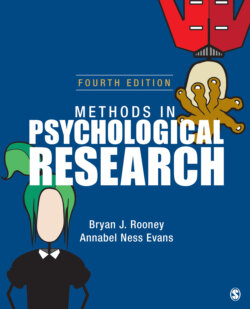Читать книгу Methods in Psychological Research - Annabel Ness Evans - Страница 66
На сайте Литреса книга снята с продажи.
FAQ
ОглавлениеQ1: Dr. Linus Pauling was the only person to have won two unshared Nobel Prizes; he lived to age 93 and wrote a book about vitamin C and the common cold. If he thinks that taking vitamins makes you healthier, it must be true. Right?
A1: Wrong! Although Pauling may have been an authority, science requires replicated research before a finding is accepted, and so far, the research in this area has produced mixed results. This does not mean that we should be cynical; amazing discoveries are made all the time. But we should remain skeptical until there is consensus in the literature.
Q2: I believe in auras because I have experienced them. Isn’t that empiricism?
A2: Although we cannot argue with your experiences, this is not scientific evidence. In science, the evidence must be based on observations that can be independently verified. This is not possible with your experiences.
Q3: What is wrong with understanding the world through logical reasoning?
A3: Nothing, as long as there are no errors in your reasoning. Indeed, this is how new predictions are formulated from theories. But science also requires an empirical test of logically derived statements.
Q4: The assumption of determinism holds that events have natural causes. Isn’t it also possible that there are forces of nature that we are not aware of?
A4: Indeed, before the discovery of atomic particles, nuclear forces were unimagined. Yes, there certainly could be forces that are unknown to us, but that does not mean that we can use them to explain events. Until we have established that they exist, they cannot be used in scientific explanations.
Q5: What is this idea of falsifiability; don’t we want to prove things in science?
A5: Yes, we do want to find evidence to support our theory, but a theory may only approximate the truth. We are interested in discovering the limits of a theory. Where does the theory break down and not account for our findings? That is, what motivates us to alter a theory or construct a new theory? Often, research involves pitting two theories against one another, each making a different prediction of outcomes. Science moves ahead when we test our theories, and that requires predictions that are falsifiable.
Q6: Is a research hypothesis just a guess of how things will turn out?
A6: A research hypothesis is not just a guess; it is an educated guess. The distinction is important because a hypothesis is a prediction based on a theory, which in turn is based on empirical research. It is a guess based on the scientific literature.
Q7: Which is better, quantitative or qualitative research?
A7: We think the best answer to this is that it is not a contest. Our bias is toward quantitative methods, but we see more and more qualitative research being published. Each approach has its place.
Q8: I’m still not clear on the cohort effect. Can you give another example?
A8: The cohort effect is a problem where age differences are confounded with history. For example, suppose you wanted to look at age differences in people’s view of war. You may find that older people have very different views from younger people. This may be an age effect, but it may also reflect the fact that older people have survived World War II or other conflicts and that may have shaped their views. The difference may be the shared experience of the cohort and not an age effect.
Q9: Is it OK to select a research topic based on something you saw on TV?
A9: Absolutely! The most important factor in selecting a research topic is your interest. Researchers are usually motivated by a genuine interest in the topic. Of course, you need to read the scientific literature to get a better understanding of what has been done in the area and what is known about the topic. We provide more information on selecting a research topic in the next chapter.
